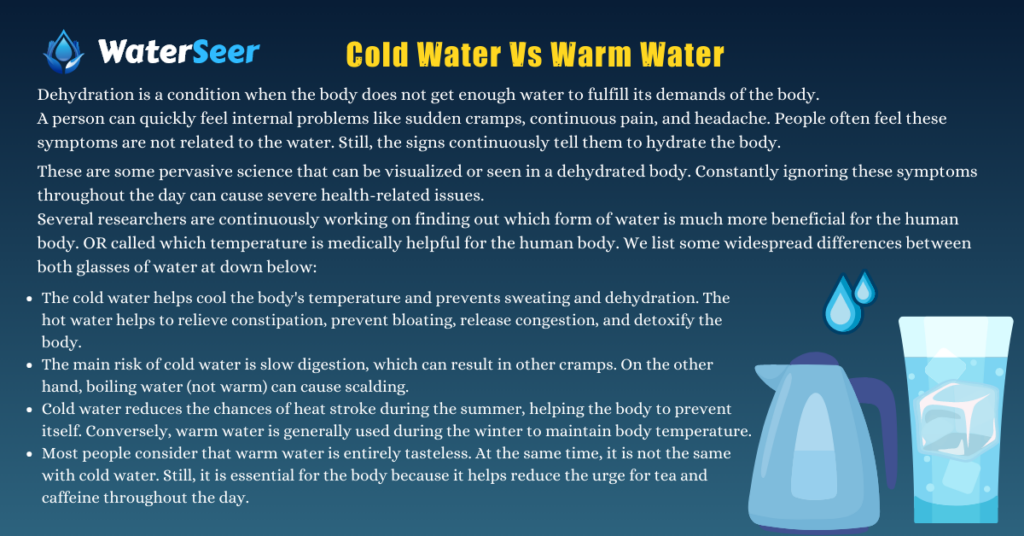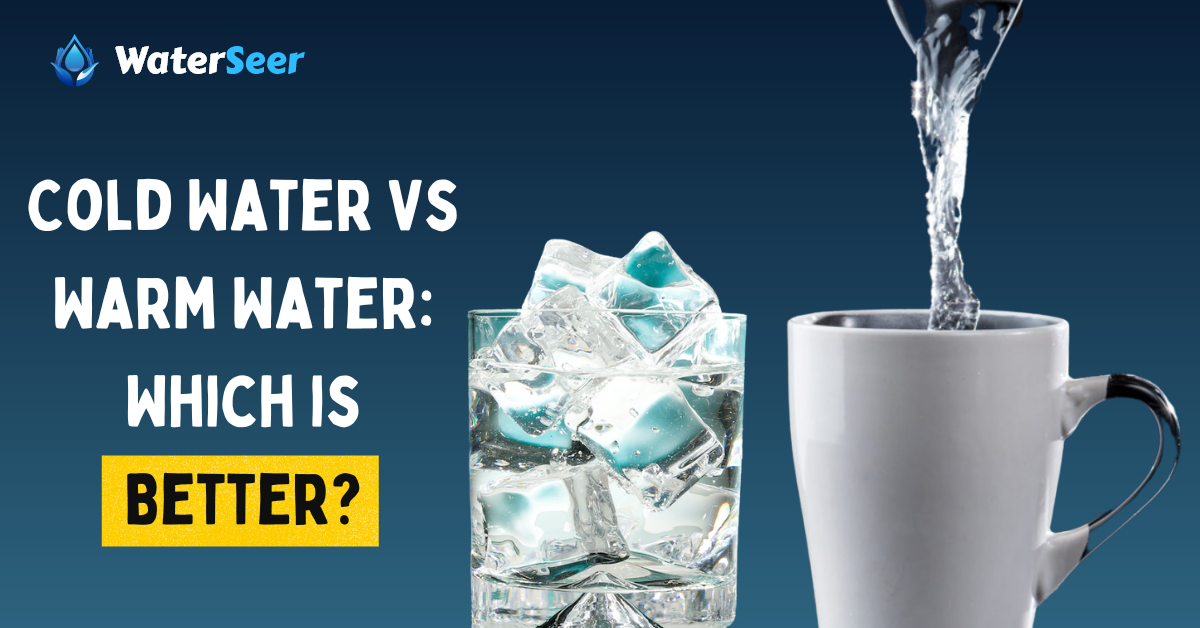Water is one of the most critical components of our day-to-day life. Keeping the body hydrated is an essential part of keeping our body healthy.
The water not only improves blood circulation but also helps carry oxygen and nitrogen from one part of the body to another, clearing the skin and detoxifying the body.
According to the National Academy of Science, Engineering, and Medicine, an adult man should consume around 3.7 liters of water per day, and a woman should consume approximately 2.7 liters daily to fulfill the body’s demands.
But to get deeper into the topic, let’s talk about whether it is healthy to drink cold or warm water.
What should you prefer?
There’s a lot to learn about these forms of water. Usually, people prefer cold water during summers and warm during the winters. But why is it so? This article will discuss cold water vs warm water and how it impacts your body and overall health.
What Are Cold Water And Its Impact on Health?

Before knowing more about cold water, let’s clarify what qualifies as cold water.
This is a fundamental question because the favorable temperature of one person cannot be favorable to another.
You might have noticed in your working area that sometimes you feel cold in AC, but the other person sitting beside you is OK with it. That is because we all are comfortable with different temperatures.
To qualify the cold water, scientist has figured out that the room temperature water is around 25.55C (OR 78F), and the cold water should be around 15.55C (or 60F).
We all know that keeping the body hydrated is very important. Some athletes prefer cold water over warm water because their internal body temperature rises, and cold water is a refreshing drink for them. Instead of choosing unhealthy beverages like soda, they opt for cold water. It also helps to reduce sweating and fulfill the body’s demand for water after heavy exercise.
The cold water also helps to flush out the foreign substances that may be present in your body. So, to detoxify your body, cold water is of great use!
Cold water also boosts the metabolism, thus helping you lose weight when consumed correctly. There is no specific time to drink water, but when you want your body to cool down, cold water should be intake.
Disadvantages of Cold Water
The above advantages do not mean cold water cannot harm you. It also has many disadvantages, like slowing heart rate and digestion. It also highly impacts the rate of metabolism.
Excessive intake continuously can cause a sore throat and congested nose. The studies also claim that cold water can be consumed when a person has a fever. Still, asking your doctor before taking any step is always recommended.
What Are Warm Water and Its Impact on Health?

As per several health care experts, drinking warm water regularly provides several benefits compared to drinking cold water.
Ayurveda practice and Chinese medicine recommend that humans try to drink warm water early in the morning to improve digestion and stimulate blood flow.
When warm water is consumed on an empty stomach in the morning, it can prevent constipation and indigestion, detoxify the body and eliminate harmful toxins. The intestinal impacts are visible on the skin, so if the stomach is clean, humans will not face skin issues like acne.
The warm water also helps to combat the pain during the mensuration cycle, joint pains, muscle sprains, and headaches. It can relieve pain by increasing blood flow through the tissues and maintaining proper circulation throughout the body.
Ayurveda and even health experts believe that the best time to consume warm water is the first thing in the morning, which helps to kick-start your day. The warm liquid with the meal will enhance your metabolism and protect the internal organs from toxins.
Disadvantages of Warm Water
Apart from the advantages, it is also essential to look at the disadvantages of warm water. Even though it has several benefits, humans cannot entirely depend on warm water all the time.
Excessive hot water (not warm) can harm the body’s system. Most individuals believe that warm water doesn’t have any taste, so they don’t rely on warm water.
But, this disadvantage can be overcome by adding some flavor to the water. For example, adding lemon and honey to warm water is a famous recipe to enhance the taste and lose weight.
Cold Water Vs Warm Water

Dehydration is a condition when the body does not get enough water to fulfill its demands of the body.
A person can quickly feel internal problems like sudden cramps, continuous pain, and headache. People often feel these symptoms are not related to the water. Still, the signs continuously tell them to hydrate the body.
These are some pervasive science that can be visualized or seen in a dehydrated body. Constantly ignoring these symptoms throughout the day can cause severe health-related issues.
Several researchers are continuously working on finding out which form of water is much more beneficial for the human body. OR called which temperature is medically helpful for the human body. We list some widespread differences between both glasses of water at down below:
- The cold water helps cool the body’s temperature and prevents sweating and dehydration. The hot water helps to relieve constipation, prevent bloating, release congestion, and detoxify the body.
- The main risk of cold water is slow digestion, which can result in other cramps. On the other hand, boiling water (not warm) can cause scalding.
- Cold water reduces the chances of heat stroke during the summer, helping the body to prevent itself. Conversely, warm water is generally used during the winter to maintain body temperature.
- Most people consider that warm water is entirely tasteless. At the same time, it is not the same with cold water. Still, it is essential for the body because it helps reduce the urge for tea and caffeine throughout the day.
When Should You Avoid Warm Water or Cold Water?
The warm water should be completely ignored when you have just reached home after a hectic exercise or a busy day. It is because your body temperature is already raised, and warm water will automatically raise your body temperature. So always avoid hot water or any hot coffee in such situations.
Cold water should be avoided entirely after a meal because it will not give your body time to break down the food. It automatically slows down the digestion process, which leads to indigestion.
Which Water is Better: Cold Water Vs Warm Water
Both the water are equally beneficial, but it all depends on the situation and when you consume cold water or warm water. As mentioned earlier, warm water is beneficial when you consume it as your first drink of the day.
In contrast, cold water is helpful when you want to cool down your body temperature.
We have already discussed the advantages and disadvantages of consuming warm or cold water. But it is also important to tell you that Ayurveda disagrees with the concept of cold water.
Ayurveda recommends drinking warm water to protect the internal organs, as cold water contracts muscles.
Conclusion
Significant sections of society believe that warm water is much more beneficial than cold water, but it is not.
They have different benefits and disadvantages, so one has to take care of them before consuming them. Cold water should be strictly avoided if anyone suffers from a chronic condition because it automatically slows down digestion and cannot remove toxins properly.
We hope this article has helped you clear your confusion and make a final decision!
There’s still a lot to learn about two forms of water because research is still going on. There may be plenty of benefits that are still not known, so it will always be recommended to know about the advantages and disadvantages of consuming more water forms.
| Check Out These Article |
|---|
| Spring Water vs. Purified Water |
| Club Soda vs Sparkling Water |
| Soft Water vs. Hard Water |
| Soda Water vs. Club Soda |
| Mineral Water Vs Sparkling Water |

